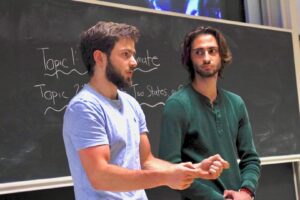Josh Busby is an assistant professor of public affairs at the Lyndon B. Johnson School of Public Affairs.
What do you think is the greatest threat to world food supply in the next 40 years?
It could be climate change itself or the effects of our reactions to climate change, through such things as support for biofuels, which may ultimately lead to diversion of agricultural land to grow crops for fuel and may also change fuel prices (making the transport of food and inputs like fertilizers more expensive).
What implications does climate change have on global food supply and production?
Highly variable rains, extreme weather events like storms, floods, and droughts, as well as melting glaciers will make it harder to grow food in many places, particularly poor countries in the developing world.
How does climate change directly affect food supply and resources in the U.S.?
Unclear. There could be periods of drought and extreme weather events in the Midwest and Southeast, but the U.S. is probably better placed than other countries to adapt. There could be some areas in the northern U.S. where growing seasons are extended. The most important impact in the short run may be diversion of agricultural land for biofuels.
What nations’ food supply and agricultural productivity will be affected the most by climate change?
Parts of sub-saharan Africa and perhaps parts of south Asia and China. They are both likely geographically to be the most vulnerable to climate change as well as having the least capacity to adapt. Asia’s vulnerability has as much to do with large populations and population densities subject to potential irrigation losses from melting glaciers.
A new report from the International Food Policy Research Institute titled “Climate change: Impact on Agriculture and Costs of Adaptation” estimates that an additional $7-8 billion per year must be invested to increase agricultural productivity and to prevent the adverse effects of climate change. Do you agree that an additional $7-8 billion per year is necessary? Why or why not?
Probably at least that much. Yes, though how you actually figure out how to spend it is quite difficult. Adaptation to climate change has to mostly happen through private actors, farmers and firms rather than governments.
Do you think a united global front will be the most effective agent for change, or do you think with climate change it happens at the micro level?
Neither. Policies at the national level that are coordinated internationally are likely to be the best way forward. For example, pending national legislation in the United States to cap and put a price on carbon would be a huge step forward, giving users of energy and producers of pollution an incentive to reduce emissions. Those policies exist in Europe and if we pass one here, we could likely encourage China and India to do something similar. The net effect of those diverse national initiatives could put us on a path to a greener economy and energy base.
What do you foresee happening to the global food supply if adequate action isn’t taken?
Stagnating food production in parts of Africa and Asia could lead to periodic shortages and famines, requiring major disaster relief operations that could otherwise be prevented.
You’re considered an expert on climate change. When did your interest in climate change develop?
College. I was an environmental activist at the University of North Carolina and participated in rallies for dealing with climate change in 1992 in the lead up to the Earth Summit in Rio. We rallied outside the UN in New York, encouraging the George H.W. Bush Administration to address the problem.
In your faculty profile it says you explore the politics of climate change. Can you explain what the ‘politics’ of climate change are?
I examine why some countries support climate change agreements while others do not, looking at domestic politics and interest groups within countries. I also study the structure of international negotiations between countries, and the role of advocacy movements for global climate change.
Does your passion for improving the climate extend beyond your professional career?
I’m a walking stereotype. I’m a vegetarian and have been since 1991. I drive a Prius. I bicycle as much as I can rather than drive. I buy carbon offsets for flights.



